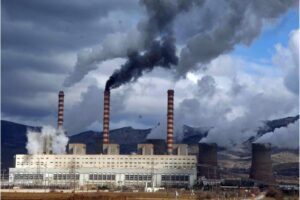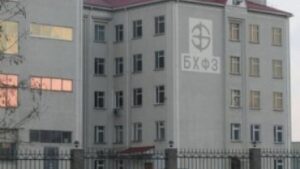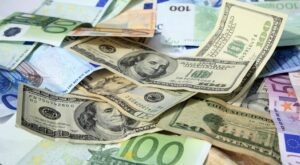
As part of the waste treatment reform, Ukraine is implementing the first major investment project: within two years, two modern incineration plants with a total processing capacity of 145,000-220,000 tonnes of waste per year will be built in Kyiv region.
According to Minister of Environmental Protection and Natural Resources of Ukraine Ruslan Strilets, on September 8 he and Head of Kyiv Regional State Administration Oleksiy Kuleba, Mayor of Boryspil Volodymyr Borysenko, Mayor of Brovary Ihor Sapozhko and Mayor of Fastiv Mykhailo Netiazhuk signed a memorandum of cooperation, effectively securing the intention to build waste processing enterprises.
“Two modern plants for household waste treatment will be built on the territory of Boryspil, Brovary and Fastiv communities. Their uniqueness lies in the use of several processing technologies at once. In particular, organic waste (food waste) will be processed with subsequent production of biomethane, as well as deep sorting of waste with the allocation of resource-valuable materials – scrap metal, glass and plastic,” the minister wrote on Facebook on Thursday.
The planned capacity of the common plant for the Brovary and Boryspil communities will be approximately 110,000-120,000 tonnes of waste per year, Fastiv – 35,000-100,000 tonnes per year. The construction period will be two years, the projects will be implemented at the expense of loans from European banks.
According to Strilets, negotiations are underway with potential investors who have long been waiting for the adoption of a law on waste management in Ukraine. The minister recalled that the waste management reform was launched by the adoption by the Verkhovna Rada in July of bill No. 2207-1-D, which creates transparent conditions and guarantees for investments in this sector of the economy.
The minister specified that Kyiv region was chosen for the implementation of the reform, since amid the Russian full-scale invasion, the capital and the capital region demonstrated the stability and invincibility of the entire country.

On September 2, the Antimonopoly Committee of Ukraine began consideration of the case on the grounds that PJSC “Scientific and Production Center” Borshchahiv Chemical and Pharmaceutical Plant “(BHFZ) committed a violation under Article 16 of the Law “On Protection from Unfair Competition” in the form of unlawful collection of commercial secrets of PrJSC “Pharmaceutical firm “Darnitsa” (both from Kyiv).
“In a statement to the Antimonopoly Committee of Ukraine, the complainant said that during the consideration of the case in one of the domestic courts, his competitor noted in the text of the recall information about PJSC FF Darnitsa, which is a commercial secret. We are talking about information about active pharmaceutical ingredients imported by the company,” the antimonopoly agency said in a press release on Thursday.
According to the report, Darnitsa also alleges that it did not give the competitor permission to obtain, disclose or otherwise use information containing trade secrets. According to the applicant, the information was obtained in an unlawful way, since it cannot be known to third parties on legal grounds, since appropriate measures are taken to protect this data.
The Committee indicates that it has found that the applicant and the respondent are direct competitors.
The Office notes that this is the second complaint of this kind in its history. In 2018, by decision No. 30-r/tk, the Provisional Administrative Board fined Ergon-Electric LLC UAH 360,000 for misuse of the trade secret of its competitor, TIK Vector-VS LLC, received from its former employees.
The defendant unsuccessfully appealed against the decision of the Antimonopoly Committee of Ukraine to the Economic Court in Kyiv, the Northern Economic Court of Appeal and the Supreme Court. By a ruling dated November 23, 2020, the Supreme Court upheld the position of the committee and upheld the decision of the courts of first instance and appeal.
BHFZ and Darnitsa are among the largest Ukrainian pharmaceutical companies. Darnitsa owns 31.8037% of BHFZ shares.

Quotes of futures for US stock indices are declining on Thursday, traders, among other things, are evaluating statistical data on the US labor market.
The number of Americans who first applied for unemployment benefits fell by 6,000 last week to 222,000, according to a report from the US Department of Labor. This is the lowest level since the end of May. According to the revised data, a week earlier, the figure was 228 thousand, and not 232 thousand, as previously reported.
Analysts, on average, expected an increase in the number of applications to 235 thousand compared to the previously announced level of the previous week, according to Bloomberg. Experts polled by Trading Economics also expected an increase in the indicator – up to 240 thousand rubles.
The US stock market could fall another 25% if the US economy enters a recession, Deutsche Bank AG strategists predict. The outlook for the equity market looks dim amid the expected fall in corporate earnings and the risk of a looming recession. Deutsche experts note that share prices are still high.
Shares of United Airlines Holdings Inc. cheaper by 0.85%. The American airline has invested $15 million in flying taxi maker Eve Air Mobility, the air carrier said in a statement.
Paper American Eagle Outfitters Inc. fall by 12.3%. The American clothing retailer reported a quarterly loss and refused to pay dividends, causing the company’s shares to drop sharply in pre-trading.
Amazon.com Inc stock price decreases by 0.5%. The American online retailer plans to continue expanding its staff, but not as actively as during the coronavirus pandemic, CEO Andy Jesse said at a Vox Media event in Beverly Hills.
Shares of Apple Inc. down by 0.75%. The company during the traditional autumn presentation introduced a new line of iPhone 14 smartphones, as well as a new generation of smart watches Apple Watch.
The value of the September E-mini futures on the S&P 500 fell by 0.18% to 3972.75 points by 15:40 square meters on Thursday. The quote of the September E-mini futures on the Dow Jones index decreased by this time by 0.05%, to 31,560 points. Futures on the Nasdaq 100 for September fell 0.36% to 12219.5 points.

Stock indices of Western European countries are changing weakly and in different directions on Thursday, as market participants took a wait-and-see attitude ahead of the results of the September meeting of the European Central Bank (ECB).
The composite index of the largest companies in the Stoxx Europe 600 region increased by 0.05% by 11:28 Moscow time and amounted to 412.24 points.
The German DAX fell 0.06%, the French CAC 40 rose 0.1%, and the British FTSE 100 rose 0.25%. The Italian FTSE MIB and the Spanish IBEX 35 lost 0.3% and 0.45% respectively.
The European Central Bank (ECB) is expected to raise key interest rates following the results of the September meeting immediately by 75 basis points (bp). The results of the meeting will be announced at 15:15 Moscow time on Thursday.
Hawkish statements from board members and a sharper-than-expected rise in inflation support such a substantial increase,” said Guprit Gill, Goldman’s global fixed income strategist.
Shares of British cybersecurity developer Darktrace plunge 31%. Darktrace reported a return to pre-tax profits in fiscal 2022 and almost doubled its revenue, but confirmed that negotiations with investment company Thoma Bravo on a possible sale of the company were terminated.
Melrose Industries PLC is down 2.3%. The British engineering company increased its pre-tax loss in the last financial half to 358 million pounds from 275 million pounds a year earlier.
Restaurant Group PLC shares rose 2.1%. The British company significantly reduced its pre-tax loss in January-June on the back of strong revenue growth.
Capitalization of the retailer Associated British Foods PLC falls by 7.1%. The company forecast sales growth for the fiscal year ending September 17 to be around 40%, but warned that adjusted earnings could shrink in the next fiscal year.
The market value of Finnish paper maker Stora Enso rose 2.8%. The company announced the purchase of the Dutch manufacturer of cardboard packaging De Jong Packaging Group for 1.02 billion euros.
French retailer Carrefour and bank Societe Generale are up 2% and 1.4% respectively.
The growth leader in the Stoxx 600 index is the paper of the British Genus Plc, working in the field of genetic breeding of animals – they rise in price by more than 13% on data on revenue growth in the past fiscal year.
The decline leaders in the indicator are the shares of the French IT company Atos SE, falling almost 15% for no apparent reason.

The dollar is weakly strengthening against major world currencies on Thursday morning, investors are waiting for the results of the September meeting of the European Central Bank and evaluate the statements of members of the leadership of the Federal Reserve System.
The ICE-calculated index, which shows the dynamics of the US dollar against six currencies (the euro, the Swiss franc, the yen, the Canadian dollar, the pound sterling and the Swedish krona), is down 0.1%, the broader WSJ Dollar Index is up 0.1%.
The euro / dollar at 8:56 Moscow time is trading at $0.9996 compared to $1.0008 at the close of the previous session, the euro is losing about 0.1%.
The European Central Bank (ECB) is expected to raise key interest rates following the results of the September meeting immediately by 75 basis points (bp). The ECB has only once raised its base rate so sharply – a few days after the launch of the euro in 1999, but then it was a short-term technical adjustment, the Financial Times notes. The results of the meeting will be announced at 15:15 Moscow time on Thursday.
“There are no doves left in the ECB, only moderate and radical hawks,” said Katarina Utermeul, chief economist for European markets at Allianz SE.
The exchange rate of the American currency against the yen rose by 0.15% to 144.04 yen.
The yen has been the main casualty of the dollar’s recent rally as the Japanese currency is particularly sensitive to rising US long-term government bond yields, Investing.com writes.
“Any attempts to return to the 140 yen/$1 level have been short-lived, and in recent days the pair hit 144 yen/$1 for the first time since 1998,” wrote OANDA Senior Analyst Craig Erlam. to the dollar.”
The yen is under pressure from more hawkish comments from the Fed. Thus, the vice-president of the US Central Bank, Leil Brainard, said the day before that the Fed would have to raise the base interest rate to levels at which there would be a slowdown in economic activity.